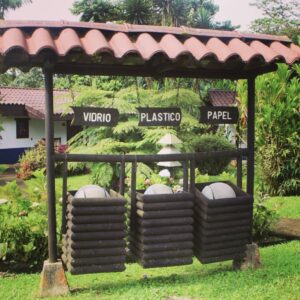Sustainable Travel: Small Changes That Have Big Environmental (and Financial) Impact
Small acts, when multiplied by millions
of people, can transform the world.~ Howard Zinn
Every day, it seems like the new stories focus on the big challenges our world faces – pollution, global warming, and other environmental issues.
It can seem daunting, but there’s hope! If each of us makes some small changes to reduce our impact on the environment, we can make a big difference together.
Now, you may be curious about how this connects to traveling. The truth is, it is quite relevant
If you want to travel in a way that’s better for the environment and reduces your carbon footprint, there are some things you can do. Not only will you be helping the planet, but you may save some cash and improve your health, too. It’s a win-win-win!
ALTER HOW YOU GET AROUND
Walk or ride a bike instead of driving.
♻️ Environmental Impact – The amount of air pollution and fuel consumption is reduced.
???? Financial Benefits – Walking and bike riding are free activities (if you ride your own bike). If you don’t have your own bike, you can rent one for a small fee from the bike kiosks that are popping up all over the place.
⚕️ Health Impact – Both walking and bike riding are great ways to get some exercise and Vitamin D while exploring a new place. The time will fly and you’ll hardly notice that you’re exercising. Walking and bike riding are also 2 of my favorite ways to stay fit when traveling.
Take public transportation instead of a cab or a rideshare service.
♻️ Environmental Impact – Public transportation is more environmentally friendly since multiple people are transported at a time, resulting in less gas and oil burned and lower emissions.
???? Financial Benefits – Public transportation costs a lot less than taking a cab or using a rideshare service.
Select the “carpool” option when using a rideshare service instead of riding solo.
♻️ Environmental Impact – As with other transportation options that carry multiple passengers, carpooling uses less gas and oil and reduces the number of vehicles on the road.
???? Financial Benefits – Carpooling is the least expensive rideshare option, allowing you to get to your destination and save money at the same time.
Pro Tip: If you DO choose this option, be sure to allow extra time to get to your destination. This is not the option to choose if you have to be somewhere at a specific time since the addition of other passengers usually adds extra time to your trip.
For tips on how to have the best Uber passenger experience, click here.
Take buses and trains instead of driving.

♻️ Environmental Impact – Since buses and trains can transport larger quantities of people, there are fewer vehicles on the road, which lessens traffic. In addition, they use a lot less fuel and release much lower amounts of carbon dioxide, keeping the air cleaner. In fact, traveling by bus instead of flying could decrease your carbon footprint by up to 13 times!
???? Financial Benefits – Buses and trains are reliable, cost-effective ways to get around and they offer the added benefit of allowing you to read, work, even sleep while someone else does the driving. (Local buses and subways are also good, affordable local transportation options.)
Wanderu is my go-to for finding the best rates on bus and train travel. It’s a search engine that helps you find deals on more than 8,000 destinations in North America & Europe. I’ve used it many times and found great deals on roundtrip bus fare to and from New York City.
Drive instead of flying.
♻️ Environmental Impact – Depending on how far you’re traveling, driving can be a more environmentally-friendly transportation method. If you need to rent a car, many car rental agencies now offer hybrid options.
???? Financial Benefits – Depending on factors such as distance, time of year, cost of gas, and the fuel economy of your vehicle, driving may be less expensive than flying.
To determine the environmental impact of flying or driving as well as the costs associated with both, check out the Fly or Drive calculator.
Choose a nonstop flight vs. a flight with 1+ stops.
♻️ Environmental Impact – Nonstop flights burn less fuel since they don’t have to take off and land multiple times. Fewer flights also reduce the amount of air pollution.
???? Financial Benefits – Although direct flights typically cost more than flights with 1+ stops, the savings are often canceled out by the amount of money you end up spending in the duty-free store, gift shop, or restaurants at the airport during your layover(s). Nonstop flights also save you time – a commodity you cannot get back, making it priceless.
Find and compare best airfares and most sustainable flights among leading airlines, travel sites, and low-cost carriers using Glooby.
ALTER HOW YOU EAT & DRINK
Recycle your paper, plastic, and glass items.
♻️ Environmental Impact – Recycling reduces the amount of waste in landfills and allows manufacturers to give the recycled materials new life. Reducing your garbage by 10% reduces your carbon footprint by 1,200 pounds a year.2

Carry a Reusable Water Bottle Instead of Buying a Single-Use Water Bottle
♻️ Environmental Impact – Carrying a reusable water bottle significantly reduces the quantity of plastic in landfills and oceans.
???? Financial Benefits – If you’re conscientious about staying hydrated, the cost of bottled water can add up quickly. And if you purchase it at an airport, you’ll have to pay at least $4/bottle or more (Yikes!) By investing in a reusable water bottle, you’ll save money by being able to fill up at water fountains and other places where drinkable water is available.
Recommended Reusable Water Bottles:
Bring Reusable Utensils Instead of Single-Use Plastic Utensils
♻️ Environmental Impact – Bringing utensils ensures that you have silverware no matter where you are. It also lessens the number of plastic utensils and accompanying wrappers in landfills. [See the TSA’s guidelines regarding utensils]
Carry Reusable Bags Instead
of Disposable Plastic Bags.
♻️ Environmental Impact – Regardless of size, plastic bags (including snacks, sandwiches, quarts, gallons, or groceries) end up in landfills unless recycled. Many grocery stores have recycling bins so shoppers can bring their unused plastic grocery bags back for recycling. Reusable bags are sturdy and can be tossed in the washing machine for a refresh. They are compact and take up very little space when not in use.
Recommended Reusable Bags:
- Reusable Shopping Bags,
- Reusable Sandwich & Snack Bag Set,
- Recyclable & Sealable Paper Sandwich Bags
ALTER WHERE YOU STAY
Choosing accommodations that prioritize sustainability isn’t just about where you sleep—it’s about the impact you leave on the planet. When you opt for eco-conscious hotels, lodges, or resorts, you’re supporting businesses that actively reduce their environmental footprint.
From energy-efficient practices to waste reduction initiatives, these accommodations are committed to preserving natural resources and protecting local ecosystems. By staying with them, you’re not only enjoying a comfortable stay but also contributing to a greener, more sustainable future for generations to come.
I had an amazing time staying at the Villa Blanca Cloud Forest Hotel and Retreat in Costa Rica. The property was absolutely stunning, the staff was incredibly friendly, and the food was delicious. What really impressed me was how eco-friendly the hotel was. They recycle their waste and even have a cow on-site whose milk they use to make delicious cheese. It was great to see such sustainable practices in action.

ALTER YOUR BEHAVIOR AT YOUR HOTEL
Part of the appeal of staying at a hotel is the availability of housekeeping. You leave the room and when you come back, your bed is made and your wet towels are replaced with fresh, clean ones. It’s as if a fairy came in, waved a magic wand, and *poof* the room is clean. But we all know that’s not the case.
For some people, staying at a hotel is an excuse for them to be messier than they are when they’re at home. However, how we behave at hotels has a direct impact on the environment.

Many hotels have begun doing their part to become more environmentally friendly and encourage their guests to skip having housekeeping freshen their rooms by providing information about how many gallons of water it takes to wash the sheets and towels each day.
How can you help?
Use your towels more than once.
Instead of using a towel and dropping it carelessly on the hotel bathroom floor, hang it up to dry so you can use it again. Most of us use our towels more than once before washing them when we’re at home, right? So why should it be any different when you’re away?
♻️ Environmental Impact – When guests use their towels more than once, fewer loads of laundry need to be done by the hotel’s housekeeping staff or laundry service. Fewer loads mean less water, detergent, and electricity used.
Don’t have housekeeping change your sheets every day.
Pending some “accident” or extra-sweaty weather, there’s no need for housekeeping to change your sheets daily. Most of us wash our sheets weekly, not daily when we’re at home. Being away shouldn’t alter your behavior.
♻️ Environmental Impact – As with towels, the fewer sheets that need to be washed, the fewer loads of laundry that need to be done by the hotel’s housekeeping staff or laundry service. Fewer loads mean less water, detergent, and electricity need to be consumed.
Bring your own toiletries instead of using the ones the hotel provides.
Although I have been guilty of using the cute Barbie-size shampoo, conditioner, and other toiletries I’ve found in my hotel room (and hoarding the ones that I didn’t use), I have started bringing my own refillable silicone toiletry bottles.
♻️ Environmental Impact – By discontinuing the use of toiletries in single-use plastic bottles, you will be helping reduce the millions of tons of plastic that end up in landfills. The benefit to you is that you are able to continue to use the products that you love.
To find eco-labeled hotels, check out Glooby.
[table id=23 /]
1 – Carbon footprint – the amount of carbon dioxide and other carbon compounds emitted due to the consumption of fossil fuels by a particular person, group, etc.
2 – Source: Earth Day Tips

